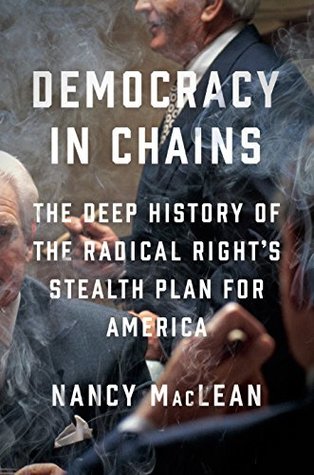More on this book
Community
Kindle Notes & Highlights
Read between
December 9 - December 13, 2022
Tyler Cowen, the man who succeeded Buchanan and now directs the cause’s base camp at George Mason, the Mercatus Center, has explained that with the “rewriting of the social contract” under way, people will be “expected to fend for themselves much more than they do now.” While some will flourish, he says, “others will fall by the wayside.” And because “worthy individuals” will manage to climb their way out of poverty, “that will make it easier to ignore those who are left behind.” Cowen foresees that “we will cut Medicaid for the poor.” Also, “the fiscal shortfall will come out of real wages as
...more
Indeed, Cowen forecasts, “the United States as a whole will end up looking more like Texas.” His tone is matter-of-fact, as though he is simply reporting the inevitable. And he enjoys great authority, as his blog, The Marginal Revolution, is the most visited intellectual blog in professional economics, known for criticizing Republicans as well as Democrats, and also respected for Cowen’s signature incorporation of economic concepts to analyze cultural phenomena from food to travel. He presents himself as a pragmatic libertarian (indeed, the blog’s motto is “small steps toward a much better
...more
The House budget chairman, Paul Ryan, has explained that such public provision for popular needs not only violates the liberty of the taxpayers whose earnings are transferred to others, but also violates the recipients’ spiritual need to earn their own sustenance. He told one audience that the nation’s school lunch program left poor children with “a full stomach—and an empty soul.”
The Republican majority in Congress has “systematically cut public health budgets that address Zika, Ebola and other ailments,” notes the columnist Nicholas Kristof.19 The insiders’ thinking helps explain why. Thom Tillis, a North Carolina state senator elevated to the U.S. Senate in 2014 with backing from the Koch apparatus, has said that restaurants should be able “to opt out of” laws requiring employees to wash their hands after using the toilet, “as long as they post a sign that says, ‘We don’t require our employees to wash their hands after leaving the restroom.’ The market will take care
...more
“Who will care for America’s children and the elderly,” she asks, now that two-thirds of mothers with children under six are in the workforce, yet “market fundamentalism—the irrational belief that markets solve all problems—has succeeded in dismantling so many federal regulations, services and protections?”53 But the cause would argue that it has answered that question over and over again: You will. And if you can’t, you should have thought of that before you had kids or before you grew old without adequate savings. The solution to every problem—from young people loaded down with student loan
...more
That very year, Tyler Cowen was commissioned to lay the conceptual groundwork for the planned push to transform America with a paper titled “Why Does Freedom Wax and Wane?”59 The paper was a review of research that could guide the Mercatus Center in its quest to eradicate the “restrictions on liberty” characteristic of twentieth-century democracies.60 What did Cowen discover? One key finding was that by the 1920s, in both Europe and the United States, “the expansion of the voter franchise” beyond “wealthy male landowners” had produced the unfortunate result of enlarged public sectors. Alas,
...more
“The freest countries have not generally been democratic,” Cowen noted, with Chile being “the most successful” in securing freedom (defined not as most of us would, as personal freedom, but as supplying the greatest economic liberty). Cowen pointed to Hong Kong and Singapore as other lasting examples, as well as to two other cases: Peru under Alberto Fujimori and New Zealand from the mid-1980s to the early 1990s, which deregulated financial markets, privatized extensively, slashed taxes on the wealthy to create “a (nearly) flat tax,” and undermined labor unions’ bargaining power.
The professor identified another commonality in the success stories: “In no case were reforms brought on by popular demand for market-oriented ideas.” The pro-liberty cause faced the same problem it always had: it wanted a radical transformation that “find[s] little or no support” among the people. Cowen delivered the action implication of its minority following without mincing words: “If American political institutions render market-oriented reforms too difficult to achieve, then perhaps those institutions should be changed.”
“The weakening of the checks and balances” in the American system, Cowen suggested, “would increase the chance of a very good outcome.” Alas, given the pervasive reverence for the U.S. Constitution, a direct bid to manipulate the system could prove “disastrous.”
But two of the country’s most distinguished comparative political scientists, Alfred Stepan and Juan J. Linz, recently approached the puzzle of U.S. singularity in another way: they compared the number of stumbling blocks that advanced industrial democracies put in the way of their citizens’ ability to achieve their collective will through the legislative process. Calling these inbuilt “majority constraining” obstacles “veto players,” the two scholars found a striking correlation: the nations with the fewest veto players have the least inequality, and those with the most veto players have the
...more


